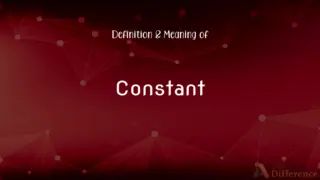Municipality vs. City — What's the Difference?
By Tayyaba Rehman & Fiza Rafique — Updated on September 8, 2023
A municipality is an administrative unit governed by a local council, which can include cities, towns, or villages. A city is a large, densely populated urban area that often has its own local government and services.

Difference Between Municipality and City
Table of Contents
ADVERTISEMENT
Key Differences
A municipality is a generic term referring to a type of local government that administers a populated area. This administrative unit can take various forms such as cities, towns, or villages. A city, on the other hand, specifically designates a large, usually populated area with its own governance and municipal services like police and public transportation.
The classification of a municipality into a city often depends on various factors like population size, economic stature, and legislative criteria. While a city usually has its own mayor, council, and city-specific public services, a municipality may not necessarily have these distinguishing features, especially if it is a smaller town or village.
Municipality and city also differ in terms of jurisdiction and responsibilities. Municipalities have broader jurisdictional responsibilities as they often encompass several different types of settlements including cities within them. Cities generally focus on governance and services within their defined boundaries.
In terms of recognition, the term 'city' often carries more prestige and implies a certain level of economic development, infrastructure, and amenities. A municipality, being a more generalized term, doesn't offer such implications. Some municipalities aspire to gain city status for these reasons.
Comparison Chart
Definition
Administrative unit with local governance
Specific large, populated area with its own governance
ADVERTISEMENT
Components
Can include cities, towns, villages
Is itself a type of municipality
Jurisdiction
Broader jurisdictional scope
Focused within city boundaries
Prestige
Generally neutral
Often considered more prestigious
Governing Body
May or may not have a mayor
Typically has a mayor and council
Compare with Definitions
Municipality
A municipality is an administrative division with its own local government.
The municipality is responsible for maintaining local parks.
City
A city is a large, populated urban area with its own government.
The city has its own police force and fire department.
Municipality
A municipality can refer to towns, cities, or villages.
Three villages and a town make up the larger municipality.
City
A city is often an economic, cultural, and political hub.
The city is known for its vibrant arts scene.
Municipality
A municipality is governed by a mayor or a municipal council.
The mayor of the municipality announced a new public health initiative.
City
A city is a type of municipality specifically characterized by its size and influence.
The city was officially incorporated as a municipality last year.
Municipality
A municipality is a public corporation with legislative powers within its boundaries.
The municipality issued new guidelines for business licenses.
City
A city generally has more advanced infrastructure compared to towns and villages.
The city just opened a new subway line.
Municipality
A municipality is a unit of local government.
The municipality collects taxes to fund local schools.
City
A city usually has a mayor and city council.
The mayor and city council passed a new sustainability measure.
Municipality
A municipality is usually a single administrative division having corporate status and powers of self-government or jurisdiction as granted by national and regional laws to which it is subordinate. The term municipality may also mean the governing or ruling body of a given municipality.
City
A city is a large human settlement. It can be defined as a permanent and densely settled place with administratively defined boundaries whose members work primarily on non-agricultural tasks.
Municipality
A political unit, such as a city, town, or village, incorporated for local self-government.
City
A large town
One of Italy's most beautiful cities
The city council
Municipality
A body of officials appointed to manage the affairs of a local political unit.
City
Short for City of London
Municipality
A district with a government that typically encloses no other governed districts; a borough, city, or incorporated town or village.
City
A center of population, commerce, and culture; a town of significant size and importance.
Municipality
The governing body of such a district.
City
An incorporated municipality in the United States with definite boundaries and legal powers set forth in a charter granted by the state.
Municipality
(politics) In Mexico and other Spanish- and Portuguese-speaking countries, second-level administrative divisions that may house one or more cities or towns whose head of government may be called mayors or, in Mexico, municipal presidents.
City
A Canadian municipality of high rank, usually determined by population but varying by province.
Municipality
A municipal district; a borough, city, or incorporated town or village.
City
A large incorporated town in Great Britain, usually the seat of a bishop, with its title conferred by the Crown.
Municipality
An urban district having corporate status and powers of self-government
City
The inhabitants of a city considered as a group.
Municipality
People living in a town or city having local self-government
City
An ancient Greek city-state.
City
(Slang) Used in combination as an intensive
The playing field was mud city after the big rain.
City
City The financial and commercial center of London. Used with the.
City
A large settlement, bigger than a town; sometimes with a specific legal definition, depending on the place.
São Paulo is the largest city in South America.
City
(UK) A settlement granted special status by royal charter or letters patent; traditionally, a settlement with a cathedral regardless of size.
City
(Australia) The central business district; downtown.
I'm going into the city today to do some shopping.
City
(slang) A large amount of something used after the noun.
It’s video game city in here!
City
A large town.
City
A corporate town; in the United States, a town or collective body of inhabitants, incorporated and governed by a mayor and aldermen or a city council consisting of a board of aldermen and a common council; in Great Britain, a town corporate, which is or has been the seat of a bishop, or the capital of his see.
A city is a town incorporated; which is, or has been, the see of a bishop; and though the bishopric has been dissolved, as at Westminster, it yet remaineth a city.
When Gorges constituted York a city, he of course meant it to be the seat of a bishop, for the word city has no other meaning in English law.
City
The collective body of citizens, or inhabitants of a city.
City
Of or pertaining to a city.
City
A large and densely populated urban area; may include several independent administrative districts;
Ancient Troy was a great city
City
An incorporated administrative district established by state charter;
The city raised the tax rate
City
People living in a large densely populated municipality;
The city voted for Republicans in 1994
Common Curiosities
How is a Municipality different from a City?
A municipality can include cities, towns, or villages, while a city is specifically a large populated area with its own government.
What is a Municipality?
A municipality is an administrative division with its own local government.
Can a City be a Municipality?
Yes, a city is a type of municipality.
Who governs a City?
A city is typically governed by a mayor and a city council.
Can a Municipality become a City?
Yes, a municipality can become a city based on factors like population size and economic stature.
Are Cities more prestigious than Municipalities?
Cities are often considered more prestigious due to their size and amenities.
Who governs a Municipality?
A municipality is typically governed by a mayor or a municipal council.
What is a City?
A city is a large, populated area with its own local government.
Do Municipalities have broader responsibilities than Cities?
Municipalities often have broader jurisdictional responsibilities as they can include several types of settlements.
Is every Municipality a City?
No, not every municipality is a city; it can also be a town or village.
How are the terms Municipality and City used differently in various countries?
The terms can have different legal and administrative implications depending on the country's local governance structure.
Do both Cities and Municipalities collect taxes?
Yes, both cities and municipalities have the authority to collect taxes.
What services do Municipalities provide?
Municipalities provide local services like water, waste management, and public transportation.
What services do Cities provide?
Cities provide similar services as municipalities but often on a larger scale, including specialized services like subways.
Is every City a Municipality?
In most jurisdictions, every city is a type of municipality.
Share Your Discovery

Previous Comparison
Comprise vs. Compromise
Next Comparison
Cyclohexane vs. HexaneAuthor Spotlight
Written by
Tayyaba RehmanTayyaba Rehman is a distinguished writer, currently serving as a primary contributor to askdifference.com. As a researcher in semantics and etymology, Tayyaba's passion for the complexity of languages and their distinctions has found a perfect home on the platform. Tayyaba delves into the intricacies of language, distinguishing between commonly confused words and phrases, thereby providing clarity for readers worldwide.
Co-written by
Fiza RafiqueFiza Rafique is a skilled content writer at AskDifference.com, where she meticulously refines and enhances written pieces. Drawing from her vast editorial expertise, Fiza ensures clarity, accuracy, and precision in every article. Passionate about language, she continually seeks to elevate the quality of content for readers worldwide.











































